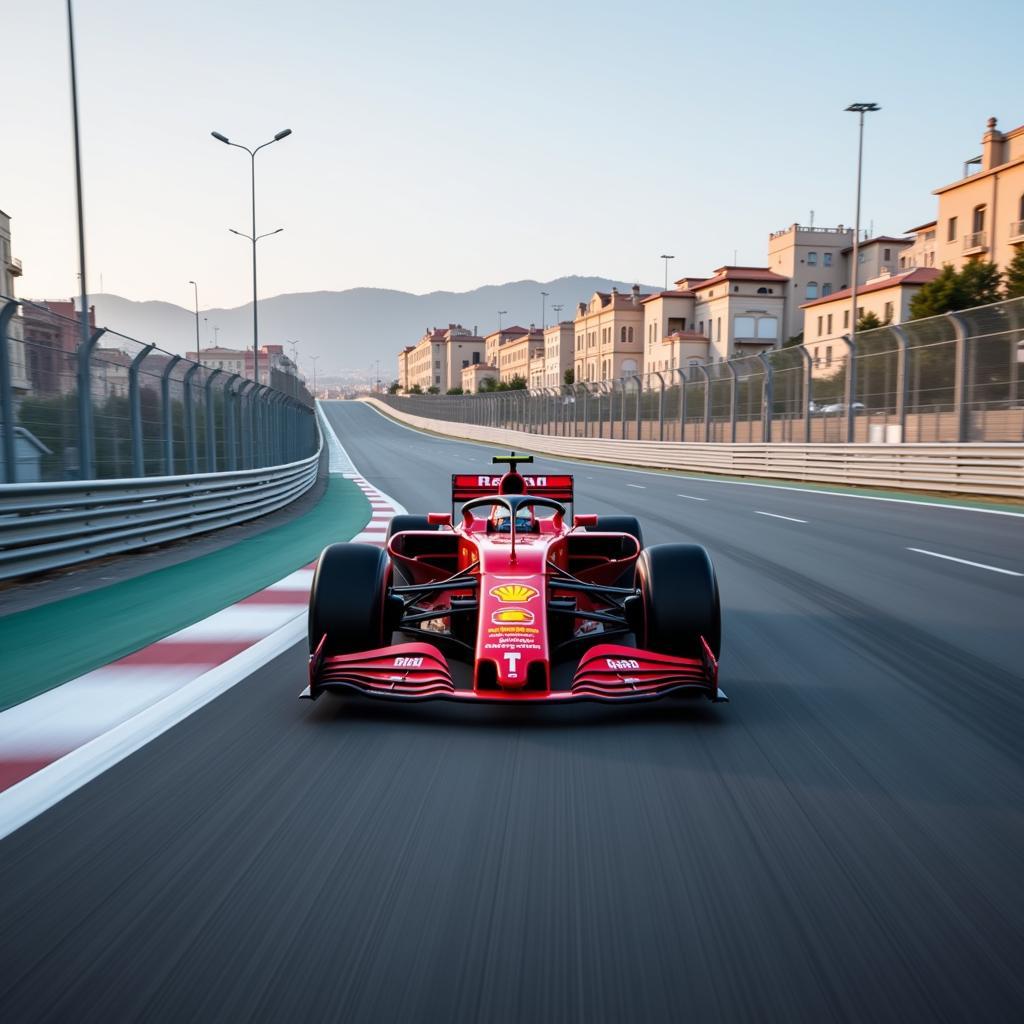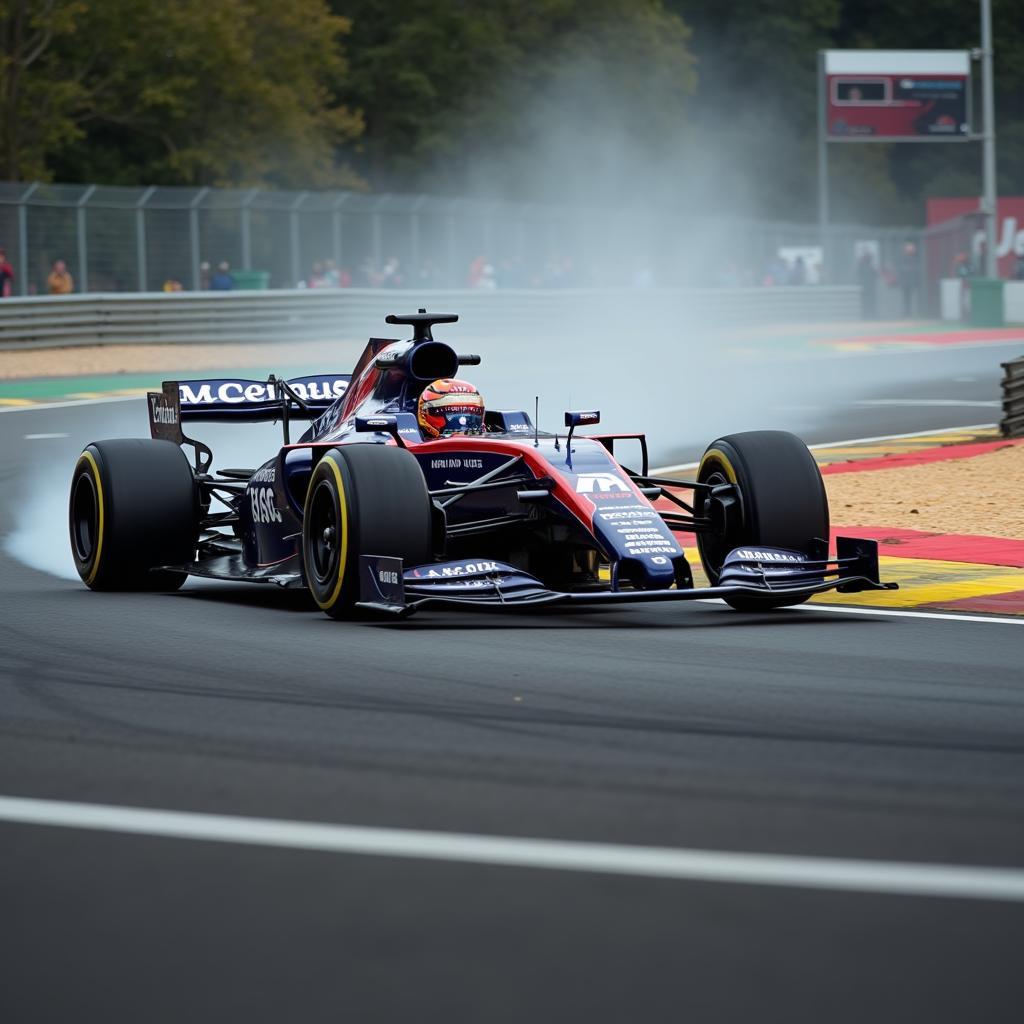Formula 1 cars are known for their incredible speed and agility. But just how fast can an F1 car go? The answer isn’t as straightforward as you might think. It depends on a number of factors, including track conditions, car setup, and the driver’s skill.
Unveiling the Speed Demons: F1 Car Top Speeds
While a definitive top speed is tricky to pin down, F1 cars regularly reach speeds exceeding 200 mph (320 km/h) on straightaways. The official F1 top speed record, however, stands at a staggering 231.523 mph (372.598 km/h), achieved by Valtteri Bottas during qualifying for the 2016 European Grand Prix at Baku. This incredible feat demonstrates the sheer power and engineering marvel that is an F1 car. However, top speed isn’t everything in F1. Cornering speeds and acceleration are just as crucial for achieving a competitive lap time. Check out our article on f1 car top speed for a more in-depth discussion.
 F1 Car Reaching Top Speed on Track
F1 Car Reaching Top Speed on Track
Factors Affecting F1 Car Speed
Several factors can influence how fast an F1 car can go:
- Aerodynamics: The aerodynamic design plays a vital role, generating downforce for cornering grip while minimizing drag on straights.
- Engine Power: The powerful hybrid power units provide immense horsepower, crucial for rapid acceleration and high top speeds.
- Track Layout: Tracks with long straights, like Monza, allow for higher top speeds compared to twisty circuits like Monaco.
- Weather Conditions: Rain and wind can significantly impact speed and handling.
- Tire Compounds: Different tire compounds offer varying levels of grip and durability, affecting both cornering and straight-line speeds.
Beyond Top Speed: Acceleration and Cornering
While top speed grabs headlines, acceleration and cornering abilities are equally important in F1. These cars can go from 0 to 60 mph (0 to 100 km/h) in around 2.6 seconds, faster than most supercars. Their immense downforce allows them to take corners at incredibly high speeds, experiencing G-forces that would make an average person black out. Remember to take care of yourself.
 F1 Car Cornering at High Speed
F1 Car Cornering at High Speed
The Price of Speed: F1 Car Costs
Developing and maintaining these technological marvels comes at a steep price. The cost of an F1 car can run into tens of millions of dollars. If you are curious about the details, check out this article on f1 car price.
The Evolution of F1 Car Speed
Over the decades, F1 cars have become significantly faster thanks to advancements in aerodynamics, engine technology, and tire development. Regulations and safety considerations play a crucial role in managing and sometimes limiting top speeds, ensuring a balance between performance and driver safety.
“The pursuit of speed is at the heart of Formula 1,” says renowned motorsport engineer, Dr. Amelia Carter. “Every component, from the tires to the engine, is meticulously designed to extract maximum performance.”
“The driver plays a crucial role in harnessing this speed,” adds Carter. “Their skill and bravery are essential for pushing these machines to their limits.”
If you are planning a trip to Europe and need a car, consider Europe car rental Dublin airport for a convenient and reliable option. It’s always important to remember to take care of any wound care needed.
Conclusion
So, how fast can an F1 car go? While the official record stands over 231 mph, the answer is constantly evolving as technology advances. But it’s not just about outright speed; it’s about the combination of speed, acceleration, and cornering prowess that makes these machines so impressive.
FAQ
- What is the fastest F1 car ever? Valtteri Bottas’s car at the 2016 European Grand Prix.
- What is the average speed of an F1 car? It varies greatly depending on the track, but typically over 120 mph.
- Why are F1 cars so fast? Advanced aerodynamics, powerful engines, and sophisticated tires.
- How much does an F1 car cost? Tens of millions of dollars.
- Are F1 cars faster than IndyCars? Generally, yes, due to different regulations and track designs.
- What factors affect F1 car speed? Aerodynamics, engine power, track layout, weather, and tires.
- How fast can an F1 car accelerate? 0 to 60 mph in about 2.6 seconds.
Need more info? Check out these related articles: F1 Car Top Speed, F1 Car Price.
For any assistance, contact us via WhatsApp: +1(641)206-8880, Email: [email protected] or visit us at 276 Reock St, City of Orange, NJ 07050, United States. We have a 24/7 customer support team.


